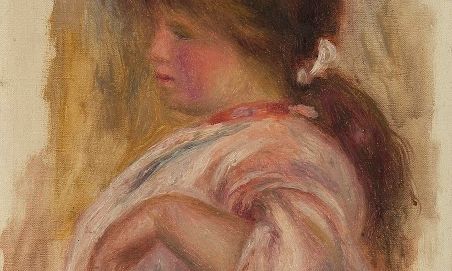Little is known about the identity of the child sitter, though experts believe they are not a "pure figment of Renoir's imagination"
A portrait of a child by the French Impressionist Pierre-Auguste Renoir, once owned by the art dealer Ambroise Vollard, is heading to market at the Paris-based auction house Aguttes on 20 April with an estimate of €450,000-€650,000.
Child sitting in a chair (1895), which Vollard sold to the father of the consignors in 1930, has never been publicly exhibited, though the painting was neither lost nor completely unknown. It is mentioned in Vollard’s 1918 catalogue Tableaux, Pastels & Dessins de Pierre-Auguste Renoir. “We thought it might be smaller”, says Pierre-Alban Vinquant, the head of Aguttes’s Impressionist and Modern department. “We were expecting a 10cm by 15cm format, in keeping with works that recently ended up in our hands, but is actually 40cm by 27cm. Neither big nor tiny.”
Renoir is the only Impressionist artist to have used portraiture as a source of income. Patrons and bankers, among other clients, would commission him to immortalise their wives and children, knowing that they would have no a say in the matter. “That’s how many portraits became works by Renoir before anything else and sometimes at the expense of their models," wrote the specialist and curator Anne Distel in 1993. Some of the first works he sent to the Paris Salon in 1865 were portraits, including that of the landscape painter Alfred Sisley's father, William Sisley.
By the 1890s, Renoir had become well-established and was free to pick his own subjects, chief among whom were his sons Pierre (b. 1885), Jean (b. 1894) and mostly Claude, aka Coco (b. 1901). His family portraits or genre paintings including children and their parents, such as Madame Charpentier et ses enfants (1878) are celebrations of youth.
As for the identity of sitter of the Aguttes picture, little is known. “We don’t know if the painting features a boy or a girl—he or she may have long hair and it is not enough to determine a gender. But we don’t think they are a pure figment of Renoir’s imagination,” Vinquant says.

